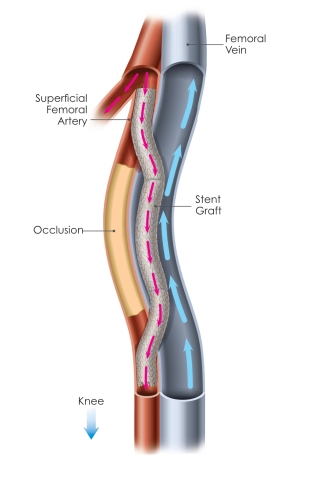SUNNYVALE, Calif.--(BUSINESS WIRE)--Results from the DETOUR I Trial evaluating the PQ Bypass DETOUR System for percutaneous bypass showed promising 12-month durability for patients with extremely long blockages in the superficial femoral artery (SFA). The data were presented as a late-breaking clinical trial session last week at the Society for Vascular Surgery (SVS) Vascular Annual Meeting in Boston, Mass. The trial enrolled lesions longer and more complex than those typically studied in SFA clinical trials, with an average lesion length of 37cm, 100% TASC II C/D, 96% chronic total occlusions (CTO), and 81% with moderate-to-severe calcification.
The DETOUR I trial, a prospective, single-arm, multicenter, core lab-adjudicated study, enrolled and treated 77 patients and 81 lesions. Primary and primary-assisted patency at 12 months in all lesions of the DETOUR I trial was 73% and 80%, respectively. Secondary patency was achieved in 94% of patients. Additional safety and effectiveness outcomes include 100% freedom from amputation, 99% freedom from acute limb ischemia, and Rutherford improvement of ≥ 2 classes in 90% of patients.
“The lesions treated in DETOUR I were more than just long, they were extremely long, completely blocked, and severely calcified,” said Dainis Krieviņš, MD, PhD, vascular surgeon and Director of the Institute of Research at Pauls Stradins Clinical University Hospital. “Endovascular devices currently approved for use on these incredibly challenging lesions have surprisingly low durability in lesions that are half the size of the average DETOUR lesion and fail approximately 40% of the time by the 12-month milestone. This truly highlights the need for the minimally invasive DETOUR procedure for long, complex SFA lesions.”
Percutaneous femoropopliteal bypass (the DETOUR procedure) is an entirely new procedure enabled by PQ Bypass’s proprietary DETOUR System. The DETOUR procedure creates a pathway with PQ Bypass’s proprietary stent grafts, originating in the SFA, traveling through the femoral vein, and ending in the popliteal artery, bypassing the diseased part of the artery. The stent grafts re-direct oxygen-rich blood around the blockage, restoring blood flow to the lower leg and foot of the patient.
“These results represent exciting promise for patients with long, complex SFA lesions, a growing, yet severely underserved population,” said Heather Simonsen, VP of Global Therapy Development at PQ Bypass, Inc. “By routing blood around the disease, rather than forcing a way through it, the DETOUR System is designed to treat extremely long lesions that are not well-addressed by current endovascular devices. We look forward to continuing the collection of clinical data in our US IDE to build upon the outcomes observed in DETOUR I.”
About Peripheral Artery Disease (PAD)
Peripheral Artery Disease, or PAD, is a common circulatory condition wherein adequate blood flow does not reach the limbs due to a build-up of fatty deposits and calcium on the artery walls. One in 5 adults over the age of 60 in the United States have PAD, and more than $4 billion a year is spent on PAD-related treatment within the US1. When this disease reaches an advanced stage within the superficial femoral artery and the popliteal artery, it develops into femoropopliteal occlusive disease.
About the DETOUR II Trial
The DETOUR II trial is the first pivotal investigational trial in the United States for percutaneous bypass and is currently enrolling. The trial will enroll up to 292 patients at up to 40 sites across the United States and Europe, and is led by national co-Principal Investigators Sean Lyden, MD, FACS and Chairman of the Department of Vascular Surgery at the Cleveland Clinic, and Jihad Mustapha, MD, FACC, FSCAI, CEO and vascular surgeon at Advanced Cardiac and Vascular Amputation Prevention Centers. The DETOUR II trial aims to expand the body of evidence evaluating the safety and effectiveness of the DETOUR System to create a percutaneous femoropopliteal bypass. More details can be found at clinicaltrials.gov, trial identifier NCT03119233.
About PQ Bypass
PQ Bypass, Inc. is a Silicon Valley-based medical device company developing the DETOUR procedure for percutaneous femoropopliteal bypass. Our proprietary DETOUR™ System is a physician-driven innovation, created by Dr. James Joye and Dr. Richard Heuser, world-renowned experts and pioneers in the treatment of peripheral arterial disease.
In March 2017, PQ Bypass received CE (Conformité Européenne) Mark approval for the DETOUR™ System.
In August 2017, Frost & Sullivan recognized PQ Bypass with the 2017 European PAD Interventions Technology Innovation Award for the DETOUR procedure.
The DETOUR™ System is limited to investigational use only. For more information, please visit www.pqbypass.com
1 Hirsch, Alan T., Lacey Hartman, Robert J. Town, and Beth A. Virnig. "National health care costs of peripheral arterial disease in the Medicare population." Vascular Medicine 13, no. 3 (2008): 209-215.




